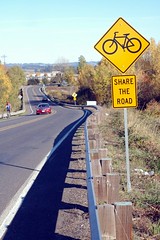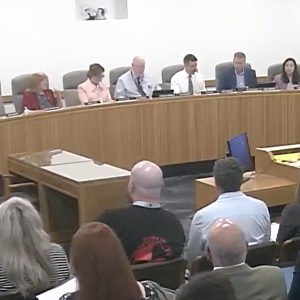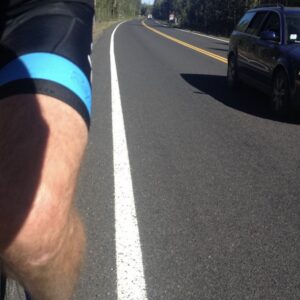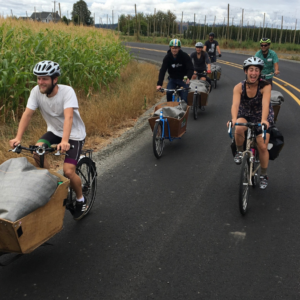Yesterday, the BTA’s Senate Bill 299 — which includes a provision about requiring a minimum three-foot passing distance — got its first debate on the floor of the Judiciary Committee in Salem.
A reporter from the Associated Press was there and filed a report that was picked up by the Oregonian.
The story includes many sides of the debate, starting off with comments of Jim Bombardier, a 58 year-old who was nailed by an SUV and is still in rehab six months later. He said:
“If it’s enforced and people take it conscientiously, it will save lives.”
Surprisingly, giving a buffer to bicycles is not a no-brainer to everyone. Here’s what Senator Jeff Kruse (R-Roseburg) thinks:
“This puts all the onus on the motor vehicle driver to make sure that the separation is there when there is nothing on the bicyclist…It’s totally one-sided.”
Also testifying at the hearing was lawyer Ray Thomas:
“I think for a lot of motorists, what they don’t understand is that being miserly with the distance is really dangerous.”
TriMet’s Mary Fetsch chimed in with a concern about downtown situations:
“Where we have some pause is in places like downtown Portland where the streets are very narrow.”
Senator Floyd Prozanski (D-Eugene) thinks three-feet might not be enough:
“If someone is sitting on a bike and they fell over sideways, when they fall, they’re going to fall further than three feet.”

A similar sentiment is shared by Ed Abrahamson, a transportation planner with Multnomah County. He says he’d rather not see any distance specified, because there are usually many factors involved in what is “safe”. He had his sign shop make a mock-up of a 4-foot passing distance sign.
Six other states — Arizona, Utah, Oklahoma, Minnesota, Wisconsin and Florida — and one municipality (Grants Pass, Oregon) already have a safe passing law on the books.
California — where cars are king — has tried and failed with a safe passing law in the past and is now trying again. According to a story in The Reporter newspaper in Sacramento, they’re facing a battle from the Teamsters, AAA and some Republican lawmakers.
They contend that if cars give room to bikes, the cars will run into oncoming traffic. Here’s what Republican Assemblyman Guy Houston says:
“I think you can make an argument that it would degrade safety for automobile drivers if you start going into ongoing traffic.”
It seems to me that the cars could/should just slow down, wait for five seconds, and then pass when it’s safe.
According to the Oregonian, an amended version of the BTA’s bill is expected to pass the Judiciary Committee. From there, it must still pass the House and Senate before being signed into law.








Thanks for reading.
BikePortland has served this community with independent community journalism since 2005. We rely on subscriptions from readers like you to survive. Your financial support is vital in keeping this valuable resource alive and well.
Please subscribe today to strengthen and expand our work.
If a car user is so impatient as to pass in an unsafe manner, then they get what they get.
What ever happened to using common sense when driving a car? What ever happened to having respect for the other people using the roads (not just bikes, peds, buses and trucks, but also other cars)?
I find the arguments against this bill, as posted above, to be spurious and, quite simply, not at all thought-out. It makes the Assemblyman, Senator, and TriMet representative look stupid and selfish, probably not what they were going for.
I agree that there might be issues on narrow streets, but again, if a driver isn’t going to use their common sense in passing another road user….
Turn it around: what if the law was about requiring minimum passing distances for other motorized users, i.e. cars passing trucks or buses? I see on Washington’s section of I-5 through Olympia that they are requiring cars passing trucks to leave sufficient room (not cutting them off). Where was the outcry about that?
With a 3 foot requirement will buzzed cyclists be flashing 3 fingers instead of 1?
Jonathan,
Thanks for keeping the steam rolling on this one! These are important and timely issues. I will definitely be contacting my state representative with my “constituent advice” on this bill. How about the rest of you bikey people out there in blogland? Do you know how to contact your state rep?
If not, here’s a good place to start:
While I support the spirit of this law, it seems almost impossible to enforce. If someone buzzes you there would have to be a police officer positioned just right to judge the distance in order for a citation to be issued, if it is even issued at all. Then the driver can argue in court that it is difficult to tell 2 feet from 3 feet, etc. In short, respectful drivers will continue to give room and idiots will continue to be idiots. I think what we really need to do is toughen the laws against negligent drivers who injure or kill cyclists.
BTW, does anyone know if there is a law about the maximum width bikes can be? If there isn’t, why not mount something like a 3 ft length of PVC pipe onto the back of your bike (oriented along the width of your bike) so that drivers have to give you room or risk hitting the pole. Of course you would probably want to have a flexible connection of some sort so that it wouldn’t end up taking you down. If I used a 6 ft pole could I take the entire lane? Maybe this is just crazy talk, but I’d rather engineer a solution than legislate one.
I’ve long been tempted to dip a paintbrush in some fluorescent paint, then attach it to a horizontal pole that holds the brush out at arms’ length on the left. Only trouble is, it’d interfere with parking…
Yes, it does seem more reasonable to hope that drivers would wait a few seconds before passing. Unfortunately, the psychology of cars tends to discourage that; I notice that my own perceptions of distance and time are dramatically different when I’m driving vs. when I’m riding vs. when I’m walking, even on the same streets.
See also this Onion article entitled “Your Honking Has Shown Me The Error Of My Ways.” ;>
http://www.theonion.com/content/node/33310
A pole?! Yes, that is crazy talk. There are many laws that are based on distance, e.g., maintaining a safe following distance. Yes, distance must often be estimated, but such testimony is often difficult to contradict since it is the only first-hand account. Thus, there little difficulty with establishing a violation.
Also, any argument that two feet is difficult to tell from three feet, etc, will not stand up in court; whether the individual has difficulty determining distance is not a concern of the law.
Finally, please don’t call it “buzzed.” That’s what you do when you go out and have a good time with your friends. This is placing someone in imminent apprehension of serious bodily harm. Please call it what it is: tortious assault and a crime. How about “assaulted,” for short?
Personally, I’d like to see an advertising campaign that focuses on waiting 10 seconds to pass safely. It seems that’s about all it requires in most situations for things to clear up for a safe pass. Maybe something along the lines of ‘what will you do with those extra 10 seconds?’ Or ’10 seconds may save a life’ or ‘wait 10 seconds and avoid years of litigation’ 🙂 RCB/BTA/Bike Gallery…how about it?
Chris – enforcability isn’t really the key issue. It is mostly about re-training drivers to give some space to cyclists. The cops will catch a few violators by happenstance but the new law would be a good tool to cite / prosecute unsafe drivers that clip cyclists. (Obviously, a violation of the three foot rule if contact was made.)
“Share the Road” signs – vague. The sign in the article (implying a law on the books) – better, more concrete and understandable for drivers.
(Forgot to mention: naturally, I’d let the paint dry first. It’s about making drivers think, not defacing their cars!)
Sent via email to Senator Kruse:
Senator Kruse,
Sir, you are quoted by the Oregonian in regards to the proposed “3-Foot Rule” legislation as saying “This puts all the onus on the car motor vehicle driver to make sure that the separation is there when there is nothing on the bicyclist”
Respectfully, sir, this is not the case. Current law requires bicyclists to ride in a bike lane if it is present, and if not present, it requires bicyclists to ride as far to the right as is practicable. (ORS 814.430(1)) This means the current law puts the onus on the bicyclist. The proposed legislation would restore balance to the law by ensuring that motorists maintain a safe distance between themselves and bicycles. I urge you to please consider this fact when weighing whether or not to support this legislation.
If the Oregonian quoted you in error, my apologies.
Thank you sir for your time.
Respectfully,
Matthew P. Picio
—
I strongly encourage other cyclists to write similar letters / emails to the senator if you are so inclined.
I’d also ask Kruse to speak with fellow Republican Senator Jason Atkinson. With all of the time he has spent in the saddle, he probably has some great stories and insight about close calls, clips, road rage, and other reasons why three feet is the LEAST the Legislature could do.
I agree that we are probably better off with this new law. However, as someone who commutes daily, I know all too well the frustration I feel when the law is on my side and I still get cut-off, buzzed, assaulted, whatever you want to call it, and no one is there to enforce the law. As they say, the law doesn’t mean a thing when you are dead. How many drivers who killed cyclists got off with a slap on the wrist in recent memory? If law enforcement is willing to buy “the sun was in my eyes” argument, and judges can’t even agree on what constitutes a brake, I’m not sure this law will make too much of a difference in changing the ways of the fools. Until the day that we run out of oil and take back the roads, I’ll rely on my 3’ pole (I’m only half serious).
Agreed, Chris. Something needs to be done to get law enforcement to actually get serious about enforcing the laws regarding motorists vs. bicycles.
“The sun was in my eyes” has to be the lamest excuse ever. They don’t let you off the hook if you’re changing the radio station in your car and you hit another car, so the sun shouldn’t be an excuse either. Use your visor, or wear sunglasses.
I just opened my vehicle registration renewal and there’s a flyer in there about changes to the rule for cars turning through crosswalks when pedestrians are present. Sheesh…if our legislature can recognize the importance of “lane + 6 feet” for peds, why can’t the recognize safe passing for bikes?
Tim #7 – River City used a similar theme in their advertising last year. It made it’s point…
AAAARRRRGGGGGHHHHH!!!!! Matt P. you have the patience of a saint. Kruse is an idiot!
If you are in a car and you are passing a bicycle that is operating within the rights granted by the state, and you bend, fold, staple or mutillate that cyclist you should go to jail. (No BS deferment program like DUII.)
3 feet or 20 feet, safe is safe.
how come it always seems like republicans are always voting down open-minded, thoughtful, community-building ideas like this????
Anonymous – I agree, and think it should be extended to pedestrians as well.
One other thing Kruse is omitting is the fact that cars *should* bear the greater burden, since they have much more mass and attain far greater speeds. Cars are much more lethal than bikes to both other bikes and pedestrians, and bikes are rarely if ever lethal to cars.
Car drivers are hermetically sealed from the elements, meaning that their vision and hearing are impaired, and that’s before distractions like the radio, cellphones, and conversations with passengers. Absolutely they should bear a greater responsibility for maintaining that distance. And besides, what cyclist actually WANTS to get closer than 4 feet from a speeding car?
I’m being nice, polite and courteous to the senator because I feel that people who argue against a reasoned argument and a polite individual look like idiots. Politicians don’t like to look like idiots, generally, so I’m more likely to actually get a response. Or at least a better or more convoluted excuse than the norm.
And if I can’t change anything, I can at least amuse myself and insire others to action through the lame and insipid words of my opponents.
That’s the theory, anyway. 🙂
Trike:
I think the drivers manual already says you leave a safe distance between bikes and cars and that drivers should use caution around bikes and peds due to situations drivers cannot see.
in other news i do put a flag out sideways on my bike and it works really well. most times the driver is not looking at you because s/he is used to seeing bikes but change configuration a little and suddenly panic sets in and drivers will give you a wide lane. why do you think we bent riders use big spinners on our trikes (other than we can and they look nice in the sun)?
I just thought of something that may help; my back ground being maritime i tend to get a little confused as to why this debate even happens so Ecca pointed out its because in my world it don’t happen.
the maritime rules have a way of looking at things that is different than folks on the road. so im going to put some maritime rules up and tell you how they apply in this context (at least to me) (URL: http://www.uscg.mil/vtm/pages/links.htm )
“SUBCHAPTER I–RULES
Part B–Steering and Sailing Rules
subpart ii–conduct of vessels in sight of one another
Sec. 2018. Responsibilities between vessels (Rule 18)
Except where Rules 9, 10, and 13 otherwise require:
(a) Power-driven vessels underway
A power-driven vessel underway shall keep out of the way of:
(i) a vessel not under command;
(ii) a vessel restricted in her ability to maneuver;
(iii) a vessel engaged in fishing; and
(iv) a sailing vessel.
(b) Sailing vessels underway
A sailing vessel underway shall keep out of the way of:
(i) a vessel not under command;
(ii) a vessel restricted in her ability to maneuver; and
(iii) a vessel engaged in fishing.
(c) Vessels engaged in fishing when underway
A vessel engaged in fishing when underway shall, so far as possible,
keep out of the way of:
(i) a vessel not under command; and
(ii) a vessel restricted in her ability to maneuver.”
“so we sailors say tonnage rules” or the bigger the boat the harder it is to maneuver so you get out of the way generally. this changes when the vessel is not powered by an engine or is doing something that makes it even harder to maneuver (semi truck in the city or bus at rush hour).
thus a sail boat (bike) has right of way over a power boat, and a row boat (ped) being rowed has right of way over a sail boat.
other rules such as channel keeping; small boats to the side leaving the deep center of the channel to the boats that need it and staying as far away from another vessel as passable are also written into maritime law.
I can Sail in any country on any water with any person in command of a ship and expect them to ALL understand these rules. this includes folks who cant read and have never even seen a rule book or paper for that matter.
so i have to ask what the heck is the problem here?
if a guy in a dugout with and out board motor can figure out that the guy in the skipjack sailboat needs maneuvering room in order to sail up the amazon river and the guy in the skip jack can figure out the guy in the dug out with a paddle has right of way. none of them talking to the other or even speaking the same lingo. cant a bunch of folks who supposedly can read or get a book on tape or even are supposed to actually know how to drive be able to figure this out?
I agree with Brad (#8).
And love the comparison to maritime rules.
What a cool, diverse group we got!
So again Ecca and i where discussing this and something else impacted the brain box. why is it that the things that follow a maritime tradition IE: planes, bikes, boats, Ecca pointed out: fleet trucks, tend to not have the same adversarial attitude as car drivers?
so why is it when we encase our selves in little suits of steel we suddenly feel like we are the bosses of every thing but if we are on things small or really big we are just concerned with doing the job?
I would suggest a change in focus in this debate. Instead of the biker versus driver factions, you people should unify and place the burden of resolution on the state. To say that drivers should give way to cyclist on roads designed for fast moving vehicles is idiotic in any form of argument. The solution is simple; re-engineer the roads to accommodate both types of transportation, preferably with a visible medium between the two. Why not you may ask? Also simple, because it will cost money and it would translate into new taxes. So I consider the matter closed no matter what laws exist. If the common sense of people will not force the state to make the only logical solution a reality. I assume no reasonability for what occurs on the road by forcing both cyclists and obviously dangerous vehicles to these cyclists to share an unsafe road. Nor will I obey any law requiring me to do so.